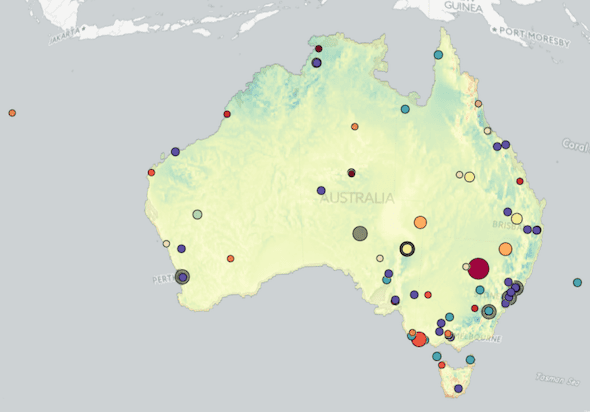The CSIRO-developed online mapping program that helps renewable energy developers find the best locations for new Australian wind, solar and wave power projects has received major upgrades, including the addition of new maps that will highlight areas of electricity network constraint, where battery storage, demand management and other decentralised energy resources can be best applied.
The range of updates to the Australian Renewable Energy Mapping Infrastructure (AREMI), were unveiled by CSIRO’s Data61 on Wednesday at the Clean Energy Summit – you can access the updated site here.
The collaboration included project partners Geoscience Australia and the Clean Energy Council, as well as the University of Technology Sydney’s Institute for Sustainable Futures, whose contribution was to develop a standardised data protocol on network information and opportunities, supported by Network Service Providers in the NEM.
Speaking at the summit, ISF research director Chris Dunstan said the free and publicly available network opportunity maps, developed by ISF with ARENA support and hosted on AREMI, illustrated areas on the electricity grid where future demand for power was forecast to exceed supply capacity.

Dunstan said the maps would not only support the growing market for decentralised energy and grid optimising infrastructure, but would help to lower consumer electricity bills in the process.
The Australian Renewable Energy Agency, which is providing $425,000 funding to support the development of the maps, says they are a priceless tool for discovering where renewable energy can add the most value in the
National Electricity Market.
“The expanded Network Opportunity Maps show where energy demand is expected to outstrip supply,” said ARENA CEO Ivor Frischknecht. “These are often locations where renewables offer an alternative to extra poles and wires and can reduce power prices whilst increasing network stability.
“In addition to the network maps, bioenergy project developers can use AREMI to find untapped biomass resources, thanks to an ARENA-supported project with the Rural Industries Research & Development Corporation (RIRDC),” he said.
“Effectively mapping and sharing renewable energy information is critical to building the energy systems of the future. This is the first time such an extensive collection of powerful renewable energy information has been available in the one place,” Frischknecht said.
“These latest improvements make the platform easier to use and more effective at visualising complex data to assist energy market developments.
“In addition to the network maps, bioenergy project developers can use AREMI to find untapped biomass resources, thanks to an ARENA-supported project with the Rural Industries Research & Development Corporation (RIRDC).
“The maps also include ocean data from the ARENA-supported CSIRO wave atlas, which is a boon to our emerging wave power sector,” he said.









